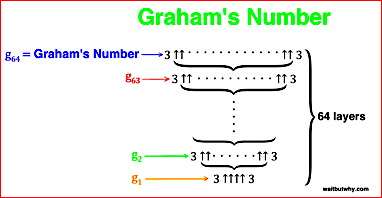« It's Probably Nothing: | Main | The intersectional house of cards has fallen. »
December 5, 2016
Graham's Number: On Beyond Googolplex

and until I learned about Graham’s number, I thought the biggest numbers a human could ever conceive of were things like “A googolplex to the googolplexth power,” which would blow my mind when I thought about it. But when I learned about Graham’s number, I realized that not only had I not scratched the surface of a truly huge number, I had been incapable of doing so—I didn’t have the tools.From 1,000,000 to Graham's Number -
Posted by gerardvanderleun at December 5, 2016 10:40 AM. This is an entry on the sideblog of American Digest: Check it out.
Your Say
Best way to get up to speed on this stuff is to go study the US spending clock.
It was posted here awhile back.
The numbers on that site are unearthly.
Since 1913 this rotten assed gov't has wasted enough stolen money to have populated all NINE planets and furnished them out Trump style and had about 50% left over for that proverbial rainy day that never seems to come.
Posted by: ghostsniper at December 5, 2016 5:55 PM
Lull yourself to sleep with the God formula:
One/zero = Infinity
Or to put it another way, the ONE, indivisible, is the Infinite All God.
Or, to weigh in otherwise, Thou Art That. To know That, is to be the answer to `What Am I?`
Asleep yet?
Posted by: Howard Nelson at December 5, 2016 6:42 PM
I actually read the article all the way through. Wow, that fellow, Tim Urban sure is a windbag. I think I saw his wife on The Newlywed Game a few years back.
https://www.youtube.com/watch?v=PS2VZkCzWSE
I like big numbers. For instance: what is the chance of a 50,000 word book coming together by random typing?
For convenience, let's assume a 31 key typewriter. It's convenient because 31 squared is 10^3. So, the chance of typing 2 letters in correct sequence is 10^3. The chance of typing 4 letters in correct sequence is 10^3 + 10^3 = 10^4. And so on.
Assuming 6 keystrokes per word, a 50,000 word book would need 300,000 keystrokes in correct sequence.
If every 2 random keystrokes represents a 10^3 chance of being typed in correct sequence then 300,000 random keystrokes is 150,000 sets of 2 random keystrokes that are in correct sequence.
That translates to 150,000 sets of 10^3 or 10^450,000. A very, very big number.
Still, books do get written. This is what happens when intelligence lays its hands on randomness. The implications of this we will leave for another day.
Posted by: michael x. at December 6, 2016 11:54 AM